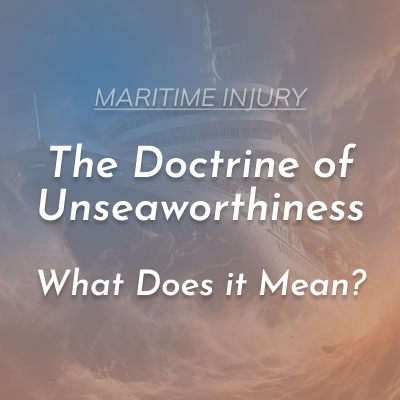
Being injured at sea can be physically, emotionally, and financially devastating. Medical bills add up, time off work takes its toll, and the pain and suffering complicate matters further.
Seafarers deserve compensation for all of these difficulties.
It is often difficult for people who work at sea to find help when their employer is not adequately compensating for injuries or illnesses sustained on a vessel.
Fortunately, seamen have several remedies available under the Jones Act and other maritime doctrines.
An unseaworthiness claim is one such remedy.
If you have suffered an injury at sea while working on a potentially unseaworthy vessel, Johns Law Group, PLLC, is here to help. Use our guide below to learn more about the doctrine of seaworthiness and see what our maritime attorneys can do to fight for your recovery.
Doctrine of Unseaworthiness
The doctrine of unseaworthiness is a fundamental legal principle in maritime law. Under the doctrine of unseaworthiness, a maritime vessel’s owner and operator have a legal duty to maintain a seaworthy vessel for every seaman who staffs it.
Under maritime law, this obligation is an absolute duty, and owners or operators cannot get around it. If the vessel owner or operator breaches their duty to maintain a seaworthy vessel, and a seaman is injured as a result the seaman may be entitled to recover monetary compensation (damages) from the owner or operator of the vessel.
What Is Unseaworthiness?
Unseaworthiness refers to the state of a vessel, its parts, its equipment, the training of its crew, and anything else on the vessel that might cause harm. However, to understand what constitutes unseaworthiness, it is helpful to understand what qualifies as seaworthy.
A seaworthy vessel is one in which all parts and equipment are reasonably fit for their intended use and where it is operated by a crew that is reasonably adequate and competent to perform the work assigned. See Ribitzki v. Canmar Reading & Bates, Ltd. Partnership, 111 F.3d 658, 664 (9th Cir.1997). An unseaworthy vessel, therefore, is the opposite—a vessel with parts or equipment not reasonably fit for their intended purposes or where the crew is inadequate or incompetent to perform their assigned duties.
The vessel’s owner or operator is responsible for keeping these aspects of the vessel in a satisfactory state. If any aspect of the vessel is defective, an unseaworthy condition exists. Seamen harmed by the unseaworthy condition exists, leading to dangerous conditions and injuries to crewmembers. Seamen harmed by the unseaworthy condition then have a claim for damages against the vessel’s owner or operator.
Filing an Unseaworthiness Claim
To file an unseaworthiness claim, a person must first demonstrate that they are among the class of people covered by the unseaworthiness doctrine under maritime law.
Next, they must prove the owner or operator’s liability due to the unseaworthiness of their vessel. If the seafarer succeeds in their claim, they are entitled to several forms of compensation.
Elements of an Unseaworthiness Claim
An individual pursuing an unseaworthiness claim under maritime law must prove the following elements:
- That the injured party pursuing the claim (plaintiff) qualifies as a “seaman;”
- That the vessel was, in fact, unseaworthy; and
- That the unseaworthy condition was the cause of the plaintiff’s injuries.
Importantly, you must be able to prove all three elements to prevail on your claim.
Who Can File a Claim?
Generally, only individuals considered seamen can file maritime unseaworthiness claims against the owner or operator of a vessel. In most cases, anyone who spends 30% or more of their working time aboard a seafaring vessel is considered a seaman under maritime law. Seafaring vessels include:
- Fishing vessels,
- Cruise ships,
- Tug and tow boats,
- Tankers,
- Oil rigs,
- Barges,
- Dredges,
- Freighters, and
- Other vessels that spend time at sea.
Crewmembers aboard these vessels and anyone who spends significant working time on them qualify as seamen under maritime law.
Demonstrating Liability Due to Unseaworthiness
To demonstrate liability for unseaworthiness, a seaman must show that an unseaworthy condition contributed to the seaman’s injury or illness.
Below are some common examples of conditions that may constitute an unseaworthy vessel under the doctrine of unseaworthiness:
- Defective equipment that is not in proper working order or is in a state of disrepair;
- Inadequate maintenance resulting in rust, corrosion, mechanical failures, or other potential safety concerns;
- Lack of proper safety equipment, such as life vests, lifeboats, and fire suppression equipment;
- Inadequate or outdated navigation systems;
- Existence of structural defects on the vessel itself, compromising the vessel’s integrity or stability;
- Existence of infestations or unsanitary conditions on the vessel, leading to illness and other health concerns; and
- Inadequate crew training or staffing to effectively and safely operate the vessel.
Since the doctrine of unseaworthiness creates an absolute duty, seafarers do not need to prove the vessel owner or operator knew about the unseaworthy condition.
Additionally, it’s important to note that these are only a few examples of unseaworthy conditions that may arise on a vessel, and many others may exist depending on the specific facts in any given case.
Compensation
Once a seafarer demonstrates liability, they must then prove the amount of damages they are entitled to recover as a result of their injuries. There are several forms of compensation a seaman may be entitled to. Types of compensation commonly available in unseaworthiness claims include:
- Pain and suffering,
- Lost wages,
- Medical expenses,
- Lost earning capacity, and
- Disability payments.
An experienced maritime law attorney can help you determine what damages you could receive.
Johns Law Group, PLLC, Can Help
Johns Law Group, PLLC is here to help if you were injured at sea. Our firm has experience handling maritime cases and can quickly identify avenues for injured seamen to recover the compensation they deserve.
Our maritime and admiralty attorneys are licensed in 12 states and take cases throughout the United States that other attorneys frequently turn down. We pride ourselves on our specialized focus in a niche area of law, and we are confident that we have the background and resources necessary to effectively represent your interests and fight to maximize your recovery. Contact us today and schedule a free consultation and see how our team can help you move forward and get the compensation you need and deserve.

